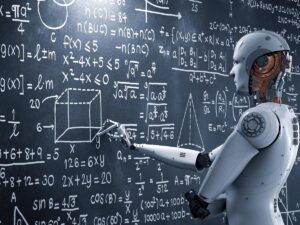AI Expected to Generate 90% of Code Within 3 to 6 Months, Says Anthropic CEO

The Future of AI in Software Development
AI’s Rising Role in Coding
Dario Amodei, cofounder and CEO of Anthropic, a prominent AI startup, has stated that artificial intelligence (AI) could soon be responsible for writing most of the software code we use today. During a recent discussion at the Council on Foreign Relations, he indicated that in as little as a year, AI might take over the majority of coding tasks currently performed by human developers.
Amodei expressed confidence that within three to six months, AI could be generating around 90% of software code. He believes that in the span of twelve months, we may encounter a scenario where AI is responsible for nearly all coding activities.
The Role of Software Developers
Despite the anticipated changes, Amodei reassured that software developers will continue to play important roles, at least in the near future. Developers will still be needed to provide AI systems with the necessary design features and specifications. The human touch in feeding models with requirements is critical during the AI’s training phase, as it shapes the AI’s output.
However, Amodei foresees a future where AI systems will increasingly handle tasks traditionally performed by humans. He believes that as AI technology advances, it will eventually close the gap, performing roles that humans currently fulfill across various industries.
Perspectives on AI’s Impact
Amodei is not alone in his predictions about AI’s transformative effect on the workforce. Garry Tan, CEO of the startup incubator Y Combinator, shared insights on social media. He revealed that an estimated 25% of founders in their upcoming 2025 winter cohort are heavily relying on AI to code their applications. Tan stated that for this group, an outstanding 95% of their code is generated by large language models (LLMs).
In addition to these personal observations, Kristalina Georgieva, Managing Director of the International Monetary Fund (IMF), has highlighted the expansive influence AI is likely to have on global employment. She shared a projection that approximately 40% of jobs worldwide could be impacted by AI over the coming years. While some professions may experience enhanced productivity due to AI integration, others may see reduced demand or even job displacement. Georgieva noted that in extreme cases, certain jobs might entirely vanish due to advancements in AI technology.
Acknowledging Benefits and Risks
Amodei has also emphasized that society is only beginning to grasp the full spectrum of AI’s potential effects. In a podcast with The New York Times earlier this year, he remarked that he believes people will become more aware of both the opportunities and challenges presented by AI over the next couple of years. This realization is likely to prompt a broader conversation about the ethical use of AI and its implications for the workforce and society at large.
The Growing Importance of AI in Various Fields
As AI continues to evolve and demonstrate its capacity for coding, its reach may extend beyond software development into numerous other industries. From healthcare to finance, the automation capabilities provided by AI could redefine job roles, fostering a landscape where AI complements human expertise rather than wholly replaces it.
This ongoing evolution signifies a need for flexibility among workers and readiness for skill adaptation, emphasizing the importance of continuous learning in keeping pace with technological advancements. Workers from various sectors may need to reassess their skills and consider how they can adapt in an AI-driven world, enhancing their value and relevance in their respective fields.
Final Thoughts
The development of AI in coding and beyond presents both promising innovations and noteworthy challenges. As AI becomes an integral player in software creation and various sectors, its implications for employment, productivity, and day-to-day operations will undoubtedly become more pronounced and widely felt. It is a pivotal moment as society navigates through these changes, balancing the immense potential AI offers with the need for responsible implementation.





